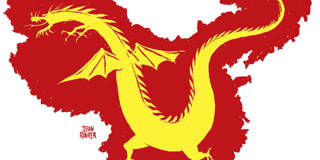Asia in the Year of the Dragon
This is the year of the “Black Water Dragon,” an astrological cycle that indicates change, but with a measure of calm, sensibility, and prudence. The people and governments of Asia certainly hope that this proves to be the case, but uncertainties – from within and without the region – are growing rapidly.
MANILA – This is the year of the “Black Water Dragon,” an astrological cycle that indicates change, but with a measure of calm, sensibility, and prudence. The people and governments of Asia certainly hope that this proves to be the case, but uncertainties – from within and without the region – are growing rapidly.
Developing Asia has performed relatively well over the past two years. It led the world out of the 2008-2009 “Great Recession,” recording 9% average economic growth in 2010 and solidifying that recovery by laying the basis for a more moderate – and, one hopes, sustainable –pace of economic expansion. In 2011, despite Europe’s debt struggles and an anemic recovery in the United States, developing Asia’s economies grew at a more restrained but still strong 7.5% average rate.
The biggest economic risk to the region is that Europe hits a financial tripwire and plummets into a deep recession, or that the US recovery stagnates during this election year. Volatility has come to define market behavior, and Asian markets are no exception. Investor sentiment seems driven by daily events rather than longer-term trends.



MANILA – This is the year of the “Black Water Dragon,” an astrological cycle that indicates change, but with a measure of calm, sensibility, and prudence. The people and governments of Asia certainly hope that this proves to be the case, but uncertainties – from within and without the region – are growing rapidly.
Developing Asia has performed relatively well over the past two years. It led the world out of the 2008-2009 “Great Recession,” recording 9% average economic growth in 2010 and solidifying that recovery by laying the basis for a more moderate – and, one hopes, sustainable –pace of economic expansion. In 2011, despite Europe’s debt struggles and an anemic recovery in the United States, developing Asia’s economies grew at a more restrained but still strong 7.5% average rate.
The biggest economic risk to the region is that Europe hits a financial tripwire and plummets into a deep recession, or that the US recovery stagnates during this election year. Volatility has come to define market behavior, and Asian markets are no exception. Investor sentiment seems driven by daily events rather than longer-term trends.